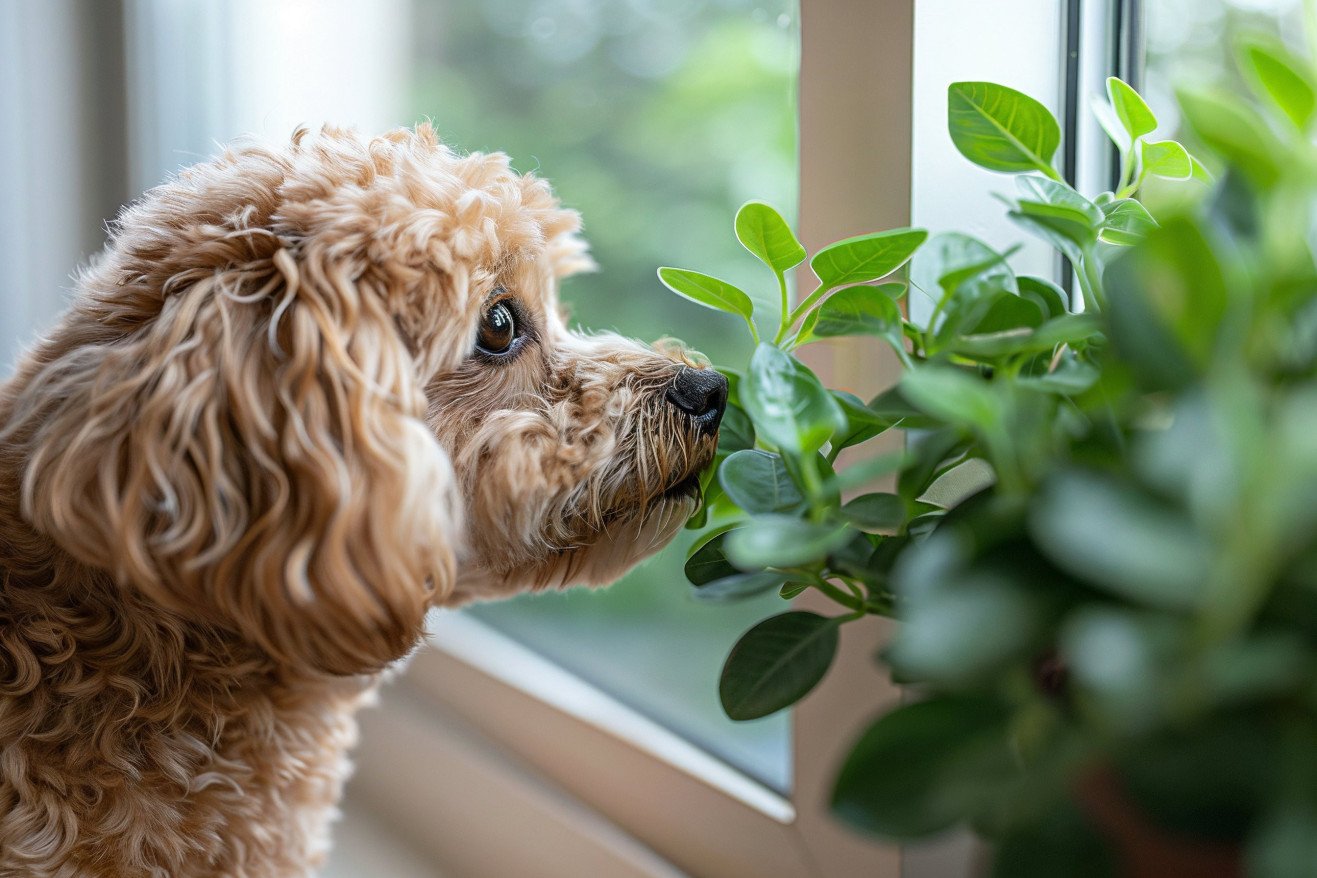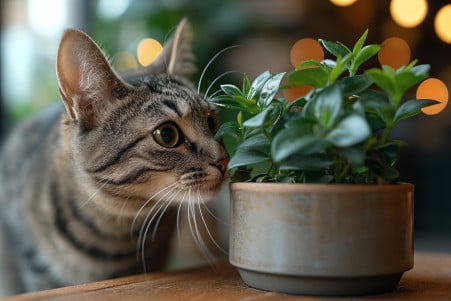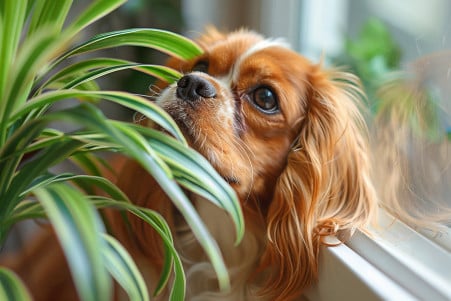Can Dogs Eat ZZ Plants? Risks and Safety Precautions
8 May 2024 • Updated 7 May 2024

If you have a ZZ plant in your home, you may be concerned about whether or not it's safe for your dog. The ZZ plant (Zamioculcas zamiifolia) is toxic to dogs due to the presence of calcium oxalate crystals, which can cause symptoms like vomiting, drooling, and irritation of the mouth and gastrointestinal tract.
To help you better understand the risks, we'll take a look at scientific research and expert insights on the toxicity of the ZZ plant and how it can affect dogs. We'll also provide tips on how to keep your pets safe around this and other popular household plants. With this information, you'll be better equipped to make choices that will help you maintain a happy home where your plants and pets can coexist.
Are ZZ plants toxic to dogs?
What Makes ZZ Plant Poisonous and How It Works
ZZ plants contain calcium oxalate, which is present in the plant's sap and tissues. According to Pistils Nursery, these calcium oxalate crystals are needle-shaped and can cause irritation and inflammation to any soft tissue they touch, including a dog's mouth, throat, and digestive tract.
If a dog eats any part of the ZZ plant, the calcium oxalate crystals can cause symptoms like drooling, vomiting, and difficulty swallowing, as reported by ZamiPet. The severity of the poisoning will depend on the amount of the plant the dog has eaten and the dog's size and health.
Although Greg.app says that ZZ plant poisoning is not usually fatal, in severe cases, dogs may need to be taken to the veterinarian for treatment to help them recover and to prevent further issues. Treatment will focus on reducing irritation, ensuring the dog is well-hydrated, and preventing complications, especially if the dog is vomiting or has diarrhea.
How to Identify and Treat ZZ Plant Poisoning in Dogs
If you suspect your dog has eaten a ZZ plant, it's important to act quickly. JustAnswer notes that early signs of ZZ plant poisoning in dogs include drooling, vomiting, and mouth irritation. The first step, as suggested by the CDC, is to remove any remaining plant material from the dog's mouth and give them water.
After that, you should keep an eye out for other symptoms, such as diarrhea, lethargy, and difficulty breathing, according to PetFluence. If these symptoms continue or get worse, FlorasEnse recommends taking your dog to the vet immediately, as more severe cases may require medical treatment. You should also be prepared to tell the vet about the plant and how much of it you think your dog ate.
It's important to act fast and keep a close watch on your dog if you think they've eaten a toxic ZZ plant. By doing so, you can help make sure that your dog stays safe and gets the care they need.
How to Make an Indoor Garden That's Safe for Dogs
While many of the most popular houseplants are toxic to dogs, including lilies and sago palms, there are still many non-toxic options that can be used to create a pet-friendly indoor garden. According to The Dog Guide San Antonio, some of the best options are spider plants, Boston ferns, and peperomia plants.
However, when adding to your collection, it's important to make sure that the plants you're bringing home are safe for dogs and other pets. As mentioned by The Spruce, there are more than 233,000 pet poisonings every year, and plants are the eighth most common poison. Pet-friendly online retailers and nurseries, such as Garden Goods Direct, can help you find plants that are safe for homes with dogs.
In addition, where you place your plants and other pet-proofing measures can help make sure that your dog doesn't accidentally eat something they shouldn't. Lively Root suggests putting plants on high shelves or in hanging baskets to keep them out of your pet's way. By taking these steps, plant lovers can create an indoor garden that's both beautiful and safe for their furry friends.
Pet-Proofing Your Home: Tips for Plant Safety
As noted by Reviewed, keeping toxic plants out of your pet's reach, like on high shelves or in hanging baskets, is one of the most important ways to pet-proof your home. Cheeky Plant Co. also suggests using natural deterrents, including lemon juice and gravel, to keep pets from digging in your potted plants.
If you have a dog, you can also help satisfy their curiosity and need to chew by creating a safe space for them to explore, like a patch of pet-friendly plants or grass, according to Bloomscape. The Kitchn recommends keeping a close eye on your pets when you bring new plants into your home and retraining them as needed to avoid accidental poisoning.
Finally, Purina suggests taking your pet's size and ability to jump or climb into account when you assess potential hazards and make changes to keep your pet safe. With these tips in mind, plant lovers can ensure that their plants and pets can coexist in their home.
Conclusion: How to Balance Your Love of Plants With Keeping Your Pet Safe
The ZZ plant (Zamioculcas zamiifolia) is toxic to dogs due to the presence of calcium oxalate crystals, which can lead to symptoms such as vomiting, drooling, and mouth and gastrointestinal irritation. Lively Root notes that the ZZ plant is mildly toxic and that while ingesting it is not typically fatal to humans, cats, or dogs, it can cause some discomfort.
The reason the ZZ plant is classified as mildly toxic is that it contains calcium oxalate, a crystalline salt that is found in many different plants. It is not poisonous, but it is an irritant that can cause a range of symptoms, including skin irritation and itching if the plant is touched and diarrhea and kidney stones if the plant is ingested. Pistils Nursery notes that symptoms of exposure to the ZZ plant include oral irritation, pain, swelling of the mouth, tongue and lips, excessive drooling, vomiting, and difficulty swallowing.
While the ASPCA does not list the ZZ plant as toxic to dogs, it does note that the ZZ plant can cause irritation, stomach upset, diarrhea, and vomiting if ingested. The ASPCA also points out that cats are known to chew on leaves, and the ZZ plant's toxic sap can cause oral irritation, a burning and painful sensation in the mouth, and excessive drooling.
If a pet has ingested part of a ZZ plant, it is important to check the pet's mouth for any plant material that can be removed. Wipe the pet's mouth with a wet, soft cloth and give the pet water to drink to help dilute the toxins. If the pet is experiencing severe symptoms, seek veterinary care.
Regular monitoring and careful placement of plants are important for keeping everyone in the home safe. With the right information and precautions, dog owners can enjoy having houseplants while ensuring that their furry friends are safe and healthy.


